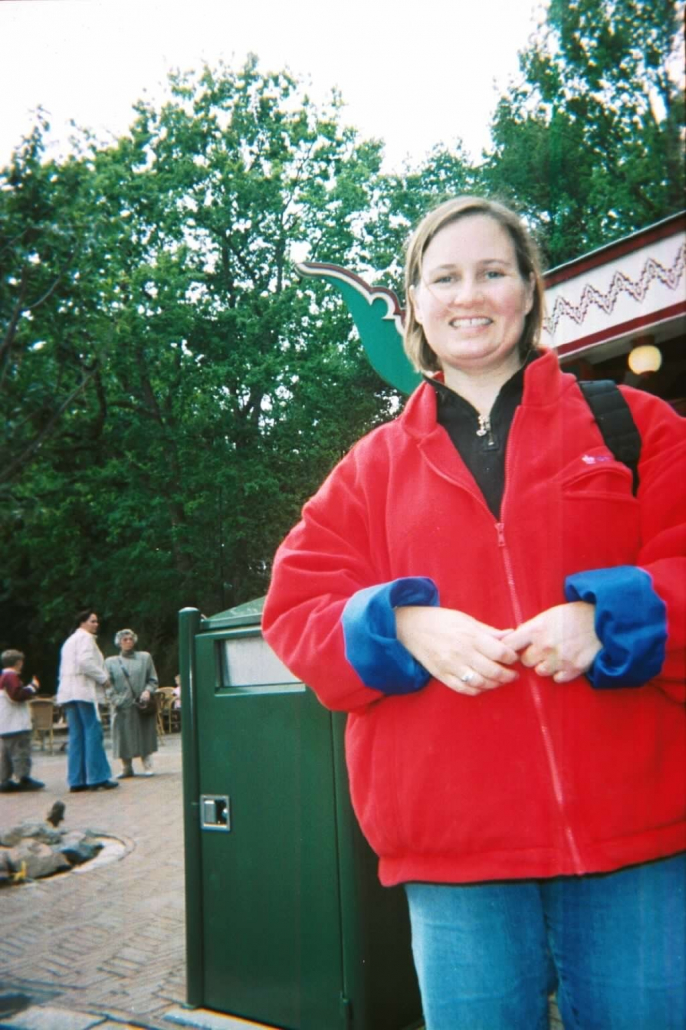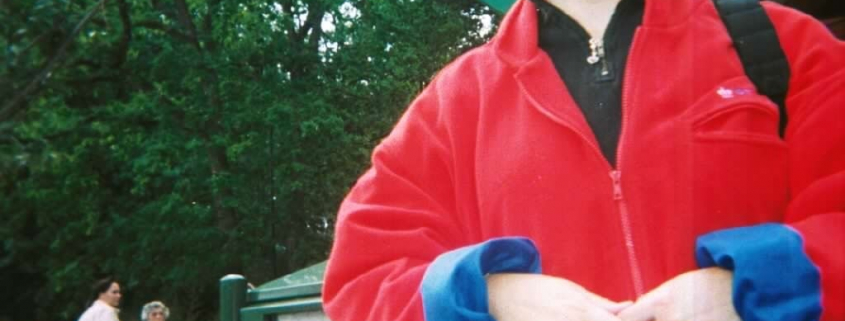A glimpse into the past: USC’s LGBTQ+ history

(Photo courtesy of Jennifer Van Loy)
Being a part of the LGBTQ+ community in a time before 2015 brought pitfalls, and being at USC was no exception. The students of the Suzanne Dworak-Peck School of Social Work in the 1990s experienced othering throughout their time at USC.
USC’s part in LGBTQ+ history
Historically, the LGBTQ+ community has faced oppression that still surviving in the present. A timeline provided by the USC LGBTQ+ Student Center looks back at the community’s pivotal moments on campus.
A year after the 1969 Stonewall Riots in New York, USC’s only openly gay member of staff at the time, Director of the Foreign Language Lab Del Whan, started the Gay Liberation Forum. The GLF was the first LGBTQ+ student group; the members were predominantly male with Whan being the only woman member.
In 1971, the Board of Trustees voted to deny the GLF visibility as a student organization. The Academic Senate requested the trustees reconsider their action, but the organization was denied recognition once again.
The following year, the GLF pursued legal action against the University. The suit proceeded and in 1975, the Gay Student Union (formerly the GLF) gained recognition from the trustees to be a student organization.
In 1982, the Gay and Lesbian Student Union put on their first Gay Awareness Week, garnering endorsements from Gov. Jerry Brown, Los Angeles Mayor Tom Bradley and actresses Jane Fonda and Lily Tomlin.
In 1986, the Lambda LGBT Alumni Association, originally unassociated with USC, held their first homecoming festivities at Mudd Hall, but it wasn’t until 1990 that Lambda was officially invited to join the Trojan Family in celebrating homecoming.
USC created a policy in 1989 for students, staff and faculty who had been diagnosed with HIV/AIDS to be granted access to all normal services, activities and programs and acknowledged that HIV could not be transmitted by casual contact.
A 50-foot rainbow flag was displayed in front of Bovard Auditorium in 1994 for National Coming Out Week. USC Lambda Alumni Association announced that they would offer a scholarship to openly gay, lesbian or bixsexual graduate or undergraduate students in the fall of the same year.
Mark DeAngelis was elected as the first openly gay president of the student body at the Marshall School of Business. In 2000, a letter from former USC President Steven Sample titled “Speak Out Against Bigotry and Hatred” was published in the Daily Trojan. It was published as a letter and discussed acceptance for LGBT students.
The Rainbow Floor, a special interest residential space for LGBTQ+ students, was established in Webb Tower in 2001. The Office for Residential Education provides community programming that allows members to learn about their LGBTQ+ identities.
The year 2003 bore witness to the Gay Lesbian Bisexual Transgender Student Assembly (formerly GLSU) staging a mock gay marriage at Tommy Trojan with 200 guests.
Lastly, the GLBTA changed their name to the Queer and Ally Student Assembly in 2010. USG passed gender-neutral housing options in 2014 and in 2017 the second-floor restroom in the Student Union became the first gender-neutral restroom on campus.
The 1990s: Suzanne Dworak-Peck School of Social Work
Just as L.A. was rocked by the Northridge earthquake in 1994, Jennifer Van Loy, Debbie Osaki and Lisa Bove were attending USC as graduate students at the Suzanne Dworak-Peck School of Social Work.
Both Van Loy and Osaki are members of the LGBTQ+ community who identify as lesbians. While the pair never met during their time at USC, they both felt safe being out in the school.
“I did not experience stigma there, I felt safe being myself,” Van Loy said. “We’re not the kind of people who go around being really obviously out and talking about it all the time and in your face political about it.”
Five years before Bove attended USC, she practiced as an ordained minister in the West Hollywood Presbyterian Church. The church was an LGBTQ+-friendly parrish in a largely unaccepting religion at the time, and Bove served as the pastor for the AIDS ministry from 1988-93.
“Part of the why I chose to get a master’s in social work is I realized after five years or more of fighting with the Presbyterians it was [clear] they weren’t going to become open for a long time,” Bove said. “In fact, they didn’t become open until 2012. I decided I needed to have a career I could make money at.”
The education at the time amazed Bove. She felt grateful to learn in an open, discrimination-free environment, but USC was far from perfect in regards to celebrating inclusivity.
“I didn’t feel like the School of Social Work or USC wasn’t a bastion of ‘Oh my god, yes, queer, trans [celebration],’” Bove said. “But it was open, and there was no discrimination so for me that was a huge liberation to be in a place where there wan’t automatically discrimination.”
Learning about relevant social topics and discussing the ways to help society by means of social work led all three women to enjoy their experiences in the graduate program.
Bove remembers most of the professors being white, with possibly one Latinx female professor and one Black male professor. As far as she can remember, they all identifed as cisgender.
“During that time I probably did notice a few little things that I thought they should have been more progressive about,” Bove said. “It probably had to do with AIDS because that was the world I came from. I know there was one guy in our class with AIDS or HIV, depending on when it was talked about, but I think they didn’t do much about it. They could have been more progressive about that.”
One clear memory Bove laughs about often with her best friend, even to this day, happened in one of her classes when one girl shared her engagement story.
“During one of the classes one of the kind of popular straight girls had gotten engaged over the weekend,” Bove said. “The class stopped. She started telling about the romantic amazing gesture her fiance did and the class was riveted, including the professor.”
Bove and her friend, who is also gay, sat back in amazement and laughed while 15 minutes of class time were taken up.
“Everything stopped to listen to this great straight romantic engagement,” Bove said. “It was sort of this example to us of, ‘Oh, well, we’re still way in the minority here.’ The whole [education] was geared towards heterosexual life and then gays and lesbians were brought in from time to time.”
Throughout her time in higher education, Bove and her group of friends used their power as a community to use gay couples as examples in the class.
“At the beginning I felt this great liberation and diversity because compared to the church it was pretty diverse,” Bove said. “Then as you get into it, you’re like ‘Well, it’s still kind of this old thinking in some ways.’”
Religion and LGBTQ+ Community
While attending USC, Bove did not completely give up preaching. She spent her time working in the United University Church.
The church is a staple campus building with its slightly dilapidated, faded red brick and ivy growing up the sides. Bove spent 15 hours a week doing a few things for the church.
Bove remembers leading a group and assisting with worship during her time. Unlike many graduate students in the masters of social work program, Bove did spend some time with undergraduate students.
After a short period at USC, Bove noticed a large difference in excitement toward academia. She loved the conversations the students and professors were having about relevant and current events and the general open mindedness of the school.
The decision to leave her church in West Hollywood percolated over time after push back from the community. Bove was associate pastor to an openly gay man, and at the time, the two were involved in the larger Presbyterian community.
“They were terrible … they were very anti-gay,” Bove said. “We would go to these meetings and hear terrible things. We were constantly trying to change the church and bring it up to the modern world.”
The struggle against anti-LGBTQ+ rhetoric within the church continued for five years which pushed Bove to pursue her master’s degree.
“There was a constant threat in the church world that you could lose your ordination … they could take away all your rights or bring judicial charges against you,” Bove said. “It was kind of this constant fighting with people who weren’t open to gay and lesbian people.”
Where are they now?
Bove has since returned to the same church in West Hollywood as a leader after having children.
“When I had kids, I wanted them to be in a gay suppportive church,” Bove said. “There are not tons [of them].”
The best part of Bove’s degree is that it allows her to work in many different areas. She started off working in child welfare and at the L.A. County Department of Children and Family Services. Throughout her career she’s worked with abused neglected children and children with leukemia and lymphoma at a children’s hospital. Working at the children’s hospital led her to where she is now: a medical social worker.
As for Osaki and Van Loy, the two met on a job at DCFS, and the rest was history. They have two children together and have been married since October 2008.
Osaki is now a therapist at Kaiser who works primarily with adults and some children who have depression, anxiety and schizophrenia. She also works with transgender individuals to help them start to transition medically.
For four years, Van Loy has been a clinical supervisor to supervise therapists that primarily work with children.
Bove, Osaki and Van Loy have all maintained a friendship since attending USC. The families go camping together and their children are friends.
Osaki and Van Loy’s daughter, Lindsey, appreciates the welcoming and kind familial environment her moms have created.
“I think my favorite part about them is they’re very accepting of different people,” she said. “I’ve never felt like I had to hide things from them … they’ve kind of always helped me be very accepting of other people too.”

